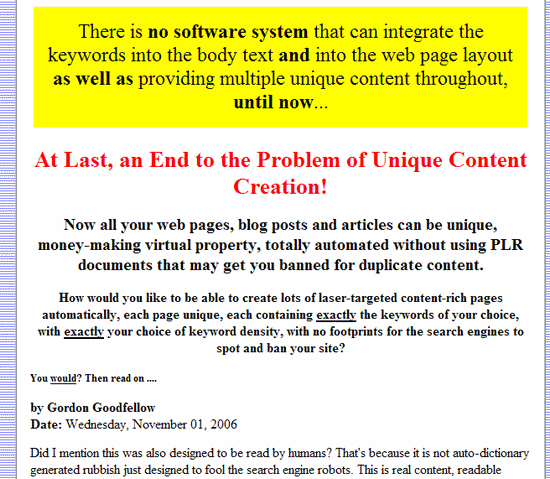If you are independent online publisher trying to make money on the web, it is likely that you may have been considering how to crank out more monetizable content without having to clone yourself.

As most experienced online marketers know, writing unique quality content is not only difficult, if not outside the reach of most people without an innate talent for this, but it is not by itself any guarantee that more money can be generated from simply publishing more of it.
What is even more difficult and little known by the mass of small independent publishers is that
a) findability and ranking inside search engines, and
b) effective value of the content to the reader
are the true critical, no-bullshit factors, that need to be attended to, to have any kind of tangible results in monetizing online content.
So it was with interest and curiosity that started reading this article, which I had run into a few days ago, and which titled itself: "The Problem with Automated Content".
I said to myself: "Oh finally someone is telling this story like it is, and informing people of what a waste of everyone's time and public resources is to create, false, duplicate content just for the sake of thinking that this approach would help you make lots of money quickly and effortlessly."
And so I dived into it:
The Problem with Automated Content
by Gordon Goodfellow Cast your mind back about three years.
Shortly after the dawning of the Google Adsense Age, webmasters learned that their sites were effectively little gold mines or "virtual real estate" as one expert put it. The more cyber-property you had, the more virtual billboards you were able to put up (also called Adsense blocks).

Photo credit: Konstantinos Kokkinis
And so if you made $n dollars by owning one web page with an AdSense ad (or any ad) on it, then it was reasonable to assume that you would make $n x 10,000 if you had 10,000 pages with similar ads on it.
Similarly, reason suggested that 1 million such pages would make you $n x 1,000,000.
Webmasters were eager to rise to this Gold Rush challenge, and so were those present-day providers of picks and shovels, the software developers. Applications were developed which could produce thousands of web pages in less than an hour from a keyword list.
All you had to do was a little research using Overture's keyword tool or its many free derivatives - the more sophisticated practitioner of this art would have added Wordtracker into the mix - and you had your keyword list.

Photo credit: AdSense Explosion
Add some adjectival superlatives such as "better" or "best" or "latest" before each keyword and you had an even bigger list. Then after each keyword add "in New York" or "in London" or even all the place names in the English speaking world (there are over 30,000 of them) and you had a massive list.
The software which was available at the time could, and still can, produce whole websites consisting of tens of thousands of pages from your own such bloated keyword handiwork. Each page of that site would be highly optimized for one keyword phrase, so that you could more or less guarantee that your page would be in number one position on all the search engines, simply because it was so specific.
Such websites could be cranked out and uploaded to your server all in the same day. You could produce 50 such websites, each with thousands of pages, in a single month; all of them with AdSense blocks on each page.
The problem was, they were all unreadable.
Pages that were manufactured at that speed could hardly rely on human dexterity in creating their content. So the software which produced them - and it was ingenious software - had to resort to other means. These largely fell into two groups:
a) [harvesting and remixing of] RSS feeds and
b) what came to be called "scraped" content.
The problem with RSS feeds was that lots of other people were using the same feed.
The problem with scraped content was that it belonged to someone else. In both cases, the hyperlink which was obligatory (but which could be turned off in the case of the scraped content) bled Pagerank away and in other ways compromised the integrity of your site. Both practices also had the habit of leaving footprints for the search engines to spot. Lawyers' purses bulged a bit as well.
At about the same time, people searching the Internet complained of seeing bland web pages with content that was either non-existent, meaningless or repetitive (even, heaven forbid, duplicate). The search engines addressed this by punishing web sites that displayed those tendencies, and so raised the informational quality of their listings for a while.
This punishment consisted of altering the search engines own algorithms so that sites or pages which demonstrated such blandness were either pushed so far down the listings that they effectively could not be seen, or delisted altogether (banned).
Along came a flurry of remedies. You could pay ghost-writers at Elance or Rentacoder to produce the content for you according to a specified keyword density (but even at $3 an hour it was expensive if you wanted to replace all those thousands of pages which had just been banned by Google).
Then a huge mini-industry of private label membership sites came along, charging you a monthly fee to use its thousands of stock articles without any copyright questions being asked. (But there were seldom the specific keyword phrases you wanted in those articles, and you could never control the keyword density; also you just knew that lots of other people were using the same articles from the same membership sites.)
Other software came along and inserted random text at the top and bottom of each article, so that each page became unique in its own way. Still more software was produced which substituted common words in existing PLR articles from stock synonyms (there was word going round that if a page was 28% more different than another page then you were okay). The problem was that if the page was read as a whole, it made no sense at all. But this could still fool the search engines. Just.
The search engines were reported to have recruited thousands of student "editors" to manually weed out such aberrations from their indices.
More emphasis was placed on non-reciprocal inbound links with the appropriate keywords in the anchor text (or within ten words left or right of the anchor text), and other "off-page" considerations. And so it went on. And on.
There were all sorts of "solutions" offered to those webmasters who had known the heady days of the big-figure Google checks for doing very little, and were willing to pay almost any price to return to them. Accordingly, the software became more ambitious. In turn, the search engines became more demanding, and there were increasing signs that perfectly legitimate sites were being punished as well as the spam pages.
We seem to have reached a point where something has to give.
The browsing public does deserve better than scraped content, RSS feeds and the abundance of proto-plagiarism that it still gets.
The need is for content that makes sense and is readable by real people and also of value, as well as ticking all the boxes of the search engine bots' latest algorithms.
Equally, webmasters have a need for such content as well, yet they also have an understandable need to be able to produce that content on demand to their increasingly information-hungry readers. To satisfy such demands it is unlikely that one piece of software alone will suffice. Instead, it seems clear that a system of content delivery needs to exist which is actually sophisticated enough to produce content which is of value to all concerned.
Originally published on October 9, 2006 as "The Problem with Automated Content" by Gordon Goodfellow on Content Artist
About the author
Gordon Goodfellow is an Internet marketer and technologist, writer and researcher. His Content Artist site explores these issues further.
And yes, I couldn't agree more.
But to my surprise, Gordon Goodfellow had indeed outdone himself. The sensitive article explaining some of the issues with automated content creation tools, was nothing else but a bait to a more sophisticated automated content creation solution, promoted on the very home page of his web site.
See for yourself:

At Last, an End to the Problem of Unique Content Creation!
Now all your web pages, blog posts and articles can be unique, money-making virtual property, totally automated without using PLR documents that may get you banned for duplicate content.
How would you like to be able to create lots of laser-targeted content-rich pages automatically, each page unique, each containing exactly the keywords of your choice, with exactly your choice of keyword density, with no footprints for the search engines to spot and ban your site?
Yes, you are reading it right. Gordon Goodfellow is trying to sell you a piece of software that will automatically create content pages for you tuned to the very specific keywords you need. You only need to add AdSense and you are ready to go.
The attack on persuading you that more sophisticated and automated content creation tools are now in need for you to make you rich is well under way.
Here is more proof. Check this PRWeb press release from 10 days ago promoting with a similar approach another PLR articles generator:
October 22, 2006 -- Having released Blog Solution, Content Solution and RSS evolution, Halfagain has now launched a new system for internet publishers – The Content Club. As the name implies, The Content Club (TCC) is an advanced content system providing publishers with quality and unique articles. Recently search engines like Google, Yahoo and MSN have upgraded their duplicate content filters. With these new changes in the search engines’ algorithm any website that uses duplicate content is penalized and ranked low down with search engines. Publishers have been turning to Private Label Rights (PLR) articles that are less saturated on search engines. However this strategy also quickly loses its efficacy as more publishers use the same articles. Until now, modifying PLR articles to make them unique has been a tedious and time consuming task.
Every month, The Content Club provides its members with 500 PLR articles on 15 different niche markets. These articles are fed into TCC’s state-of-the-art technology article rewriter tool that can produce thousands of variations of the articles using a very advanced thesaurus feature. Members can also upload their own articles online and edit these automatically.
According to Alan Luk - Internet Marketer and SEO specialist “ Not only does the Content Club provide fresh PLR articles to members every month, its proprietary "Auto-Rewrite" system ensure that all the articles are "unique". This is extremely important given how publishers are battling against the duplicate content penalty.
Another key feature of The Content Club is the “Keyword Infuser”. Using this tool, publishers can target less competitive key phrases but achieve top rankings and generate more traffic using a wider keyword database.
To make The content club a complete publishing package, Halfagain is also offering the following software bonuses – BlogSolution, ContentSolution and RSS evolution.
The Content Club can be accessed through:
http://www.freoreviews.com/download/contentclub
(Source: PRWeb)
My advice?
If you are reading because you want to make the quickest and largest buck with the minimum effort required, you are being sold a dream that will not materialize.
If there is someone who benefited from the use of such useless content and unethical content publication approaches, these have been those who have done it first, when no-one had yet realized what was going on. Some thousands naive and unwise web users, have fallen prey of these tactics and have provided some tangible returns to those early scammers.
But web users and search engines get rapidly informed, and learn rapidly what to keep a distance, avoid or ban entirely. Easy games don't have a long life on a platform like the Internet, though it is true that novel and unprepared users jump in naively to learn all about this new reality every day.
The time for littering the web with fake automated content is over. Use your money and intelligence to build automated systems that do things that can be of real value to your potential customers.
For those like me, who are not after the "American-money-making-dream", but are looking to give greater meaning, freedom and value to their lives as independent publishers, what really counts is not how much money you can gather in the shortest time possible, but rather how much "good" you are creating for yourself and others while making a living at it.

 , JP Morgan Stearns analyst Bob Peck estimates that YouTube will clock about $100 million of revenue this year, of which only $20 million will come from overlay ads (presumably the kind that YouTube is paying a split to production partners on). The rest will come from display advertising on the video pages.
, JP Morgan Stearns analyst Bob Peck estimates that YouTube will clock about $100 million of revenue this year, of which only $20 million will come from overlay ads (presumably the kind that YouTube is paying a split to production partners on). The rest will come from display advertising on the video pages.







